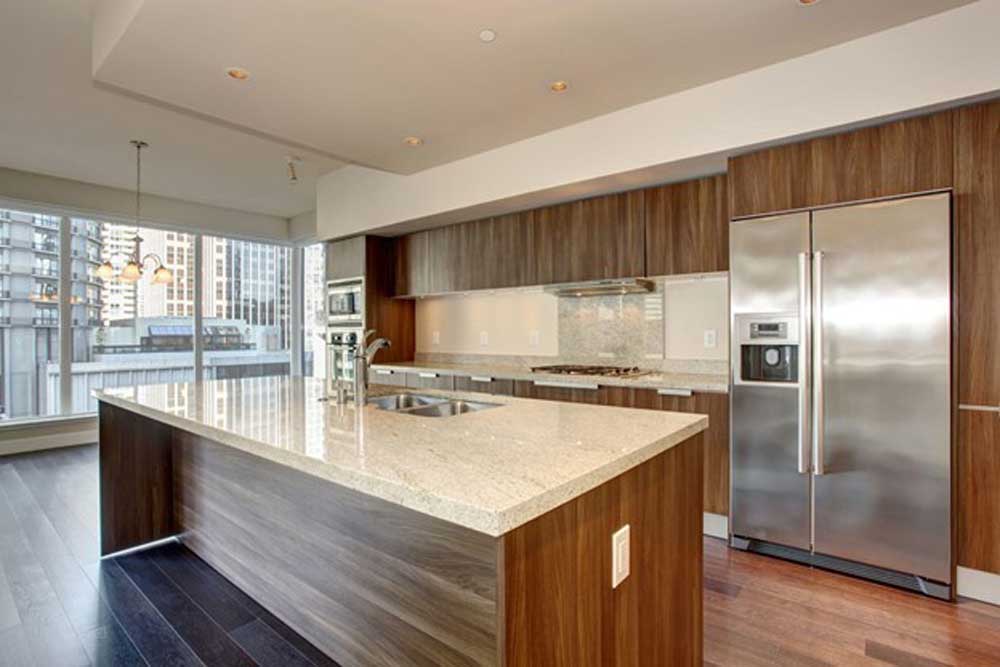Granite has always been a popular choice among homeowners wishing to improve the look and feel of their kitchen. Various factors are to be considered when choosing the right stone for your kitchen benchtop surface. The durability of the stone, resistance to scratching, visual appeal, and more are some aspects to ponder upon before purchasing your benchtop.
Granite worktops have a beautiful look in kitchens and bathrooms, as well as additional benefits. If granite has made it to the top of your list, here are some pros and cons for you to decide if it’s a good choice for your kitchen.
Advantages:
- Appealing to the eye
Each granite block is distinct, with its subtle shading, hues, and patterns. It allows you to create a one-of-a-kind benchtop that you won’t find anywhere else. In addition, you can select an exclusive slab that complements the style of your kitchen cabinets and walls while also adding to the overall attractiveness of the space.
- They increase the value of your home
Granite Benchtops are not only an instant luxury addition to your kitchen or bathroom, but they are also a long-term investment that adds value to your property.
- They are durable
Although granite is not indestructible, it is a fairly durable material resistant to scratches and will survive for decades. The only material that can scratch granite legitimately is a diamond from another piece of granite. That’s how sturdy and durable the stone is.
- Scratch Resistance
Granite is a seven on the Mohs scale of mineral hardness. It means that only a few minerals are capable of scratching it. Therefore, while cutting on granite is possible, it is not advised because it might dull your knives and create a difficult-to-remove metal residue.
- Heat Resistant
When exposed to heat, granite kitchen benchtops do not melt or blister. Because granite is a heat-resistant material, it is ideal for use near a range or stove. They are one of the most heat-resistant surfaces available in the market. It is acceptable to place hot pots or pans directly on your countertop because granite can withstand the heat without being damaged or weakened.
- Stain Resistant
Not only is granite resistant to heat, but it is also stain-resistant. When properly sealed, granite benchtops will not absorb liquids. Work with a professional to ensure that your surface is properly sealed to retain its lovely appearance for a long time.
- Resistance to chemicals
Chemical resistance is high in granite benchtops. Acids and bases are harmless to the substance. However, avoid frequent usage because some chemicals will wash away the sealer over time, necessitating resealing before the recommended time.
- Sustainability
Over several centuries, a single quarry site supplies stone for hundreds of commercial and residential projects. Granite is also a near-perfect benchtop material in its natural condition. It merely takes basic processing to be ready for use in your kitchen once it has been quarried. On the other hand, engineered materials have a complex manufacturing process that frequently involves toxic chemicals and detrimental emissions into the atmosphere.
Disadvantages:
- They may be permeable.
Liquids may be absorbed and cause long-lasting stains if you don’t seal your granite benchtop or if the stone was sealed improperly from the start. Bacteria can live in the pores of a poorly sealed tabletop. It is critical to have your countertop resealed every year to avoid these problems.
- They might be susceptible to cracking.
Although granite countertops are quite durable, there is still the possibility of chipping. Therefore, a granite repair specialist may be required if a heavy object is dropped on a corner overhang, for example, to repair any fractures or damage.

